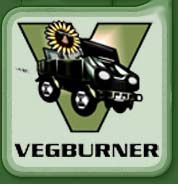Implications
of Vegetable Oil Fuel Use
1 The Diesel Engine
2 Theory of Vegetable Oil Use as a
Fuel
3 Engine suitability
4 Heating the Oil
5 Biodiesel
6 Micro Emulsions and Blends
7 Vegetable Oil Engine Design
8 Vegetable Oil Furnaces and Heaters
9 Oil Types and Filtering
10 Taxation
11 Implications of Vegetable Oil
Fuel Use
12 Sources
Fuelling Diesel engines with vegetable oil has a number of
implications both economically, environmentally and also for
fuel security, job creation, agriculture, rural development,
energy supply and public health.
Diesel engines are used extensively world wide for transportation,
electricity generation and for powering machinery. Diesel
engines have a relatively long life and will doubtlessly be
a widely utilised power unit for some years to come. For any
given diesel power unit there is a suitable vegetable oil
based fuel solution.
The distribution network for liquid hydro-carbon fuels is
already established. Facilities for the distribution of diesel
fuel are suitable for vegetable oil distribution.
Detailed studies into alternative transportation fuels find
biofuels a good alterative with pure plant oils as the most
suitable[16][17][18]
Waste Oils
There are large amounts of waste vegetable or animal oils
and fats. The disposal of these waste products is unsatisfactory.
Large amounts are illegally deposited in the sewers or sent
to landfill.
The main use for waste oil, as an animal feed component,
has been brought into doubt due to the risk of BSE. The risk
of animals being exposed to infection from animal fats deposited
in waste vegetable oil has been identified. The EU has proposed
a ban on the use as feed that is set to be adopted late 2002.
The UK DETR estimated that there is 100,000 tonnes of recovered
vegetable oil available in the UK[19].
There is plenty more cooking oil that is not recovered. Recycling
these waste products as fuel would increase their value and
potentially bring marked improvements to their management.
Job Creation and other Economic Benefits
Developing the use and production of these fuels and could
lead to job creation in fuel development, agriculture, oil
production, waste oil collection and processing as well as
in engine and equipment design and supply. There are numerous
economic benefits to be gained from the production of vegetable
oil fuels and the development of fuel production and engine
technologies.
Studies have shown biofuel production would lead to the
creation of 16-26 new jobs for each thousand tons of mineral
oil fuel replaced per year. That is 50 times more employment
than with the production of mineral oil fuels. Replacing 1%
of EU fossil fuels with biofuels would create between 45,000
and 75,000 new jobs.[18]
Large markets exist worldwide for alternative fuels. Vegetable
oil fuels are particularly attractive. There are great potentials
for technological developments in fuel crop production, vegetable
oil fuel production and in the area of vegetable oil engines
and diesel engine conversion. Leading these developments stands
to give large economic benefits.
Oil Plant and Cropping Developments
There is a wide range of oil producing plants and almost endless
possibilities for development of suitable oil crops and cropping
methods.
Oil crops offer a sustainable energy production method. To
be truly sustainable the current problems with large scale
farming and mono-cropping would have to be addressed in any
fuel oil crop cultivation. Reports recommend the use of the
most environmentally friendly methods of cultivation[16][18]
A much touted candidate for oil production is Algae. Algae
will reproduce faster than any other plant. Yields of 30 –
40 % by weight are possible with continuous cropping.
Fuel Security
Recent changes in political relations between net fossil
oil producing countries and net fossil oil consuming countries,
instability in oil producing regions as well as the depletion
of many existing oil fields make fuel supply is anything but
secure.
Development of vegetable oil fuels could lead to greatly
reduced dependence on fossil oils. Although to provide totally
secure energy supply other technologies would need development
and large scale energy conservation measures would need to
be implemented.
Emissions
The traditional image of the diesel as a dirty smoke billowing
engine is being dispelled by rapid developments in diesel
engine technology. Largely due to engine efficiency demands
and emission legislation great improvements are being made,
with passenger vehicles often leading the way. Engines designed
to run specifically on vegetable oil fuels bring further advantages.
Vegetable oil fuels have the great advantage over fossil
fuels of being potentially carbon neutral. Carbon dioxide
produced through their combustion is absorbed by the next
oil crop grown, offering a sustainable carbon cycle.
Other levels of exhaust emissions have, on balance, been
shown to be comparable or improved if a suitable vegetable
oil fuel is burnt in a suitably equipped engine where complete
combustion was achieved.
‘Up stream’ emissions, those created by the production
of a fuel, are very impressive with vegetable oil fuels. Using
a crop that requires minimal attention with properties that
allow for easy cropping, grown under a system of organic agriculture
and using the oil after a minimal amount of processing allows
for very low ‘up stream’ emissions.
Summary
Vegetable oil fuels offer an improved energy supply option.
Other proposed substitutes for fossil oil have large problems
with equipment uptake and fuel production, distribution and
handling. With vegetable oil fuels almost everything required
is in place or could rapidly be provided.
1 The Diesel Engine
2 Theory of Vegetable Oil Use as a
Fuel
3 Engine suitability
4 Heating the Oil
5 Biodiesel
6 Micro Emulsions and Blends
7 Vegetable Oil Engine Design
8 Vegetable Oil Furnaces and Heaters
9 Oil Types and Filtering
10 Taxation
11 Implications of Vegetable Oil
Fuel Use
12 Sources
|



